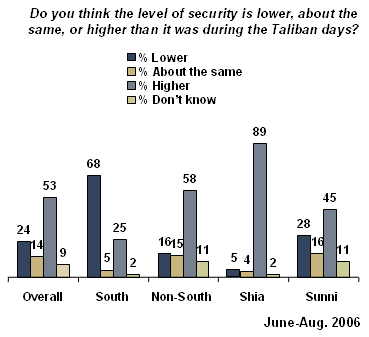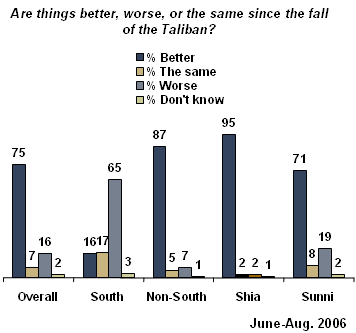GALLUP NEWS SERVICE
PRINCETON, NJ -- Five years have passed since the beginning of the U.S.-led war in Afghanistan. Accounts of daily life from the war-torn country are grim, conveying a lack of security caused in large part by a rampant opium trade and a resurgence of the Taliban. However, a Gallup World Poll conducted in Afghanistan this summer finds that perceptions of security are more positive than negative, but vary widely by region, religious sect, and ethnicity.
Various media accounts have portrayed the Afghan population as shell-shocked and paralyzed by the country's lack of security. In a recent CNN special report, correspondent Anderson Cooper traveled to Afghanistan to assess the situation first-hand and concluded, "These days, no place is safe in Afghanistan." On Oct. 8, 2006, Gen. David Richards, commander of the NATO forces in Afghanistan, said that the country is at a "tipping point" and that without security improvements that improve their day-to-day lives, the majority of Afghans may decide to support the Taliban.
On the whole, the most recent poll results do not support that dire prediction. Overall, a slight majority of Afghans polled -- 53% -- say they think the level of security is higher now than it was during the reign of the Taliban. Fourteen percent say the level of security is about the same, and 23% say it is worse.
However, it is crucial to note the differences of opinion on this matter by ethnicity, religious sect, and geographic region. While nearly 9 in 10 members of the minority Shia sect say that security is better since the U.S. invasion, fewer than half of Sunni Muslims (45%) agree. There are also significant differences by ethnicity -- just 39% of ethnic Pashtuns agree that the country is more secure now, versus 64% of all non-Pashtun ethnic groups.
These religious and ethnic disparities are hardly surprising. The Taliban is overwhelmingly comprised of Sunni Muslim ethnic Pashtuns, a large number of whom reside in the South and East of Afghanistan. When the results are further analyzed based on geography, it is easy to see how these two regions can bring down the overall average: just 25% of Southerners feel more secure now than they did under the Taliban. Forty-three percent of Afghans living in the East said the same, while an identical percentage of Easterners gave no answer to the question.

In a recent report published by the think tank Foreign Policy in Focus, Stephen Zunes proclaims that, "…Afghans are actually worse off now than they were before the U.S. invasion." Most Afghans themselves disagree -- 75% say things are better since the U.S.-led invasion and the ensuing fall of the Taliban. Even a clear majority of Pashtuns (60%) and Sunnis (71%) agree that life has improved since the Taliban's ouster. Again, however, sentiment is very different in the South, where two-thirds (65%) say that life is worse since the fall of the Taliban.

Reports of the escalation of violence in Afghanistan during the past year are vitally important for the world to hear. But evidence that Afghans' personal experiences and perceptions of security vary so widely should not be ignored, either. World Poll data offer a more refined understanding of the current situation, not to mention a degree of hope that, for some of the Afghan population at least, conditions are improving rather than deteriorating.
Survey Methods
These results are based on in-person interviews with randomly selected stratified national sample of 1,196 adults, aged 18 and older, conducted June 13, 2006, to Aug. 22, 2006. For results based on these samples, one can say with 95% confidence that the maximum error attributable to sampling and other random effects is ±3 percentage points. In addition to sampling error, question wording and practical difficulties in conducting surveys can introduce error or bias into the findings of public opinion polls.